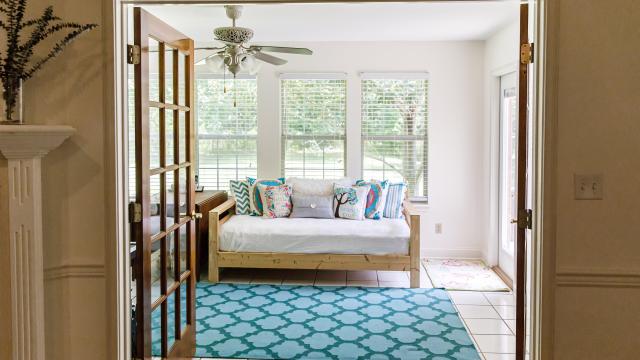Realtors, just like any professional group, often communicate via a dense set of jargon that is often used to obscure a property’s faults and emphasise its features. This can range from using phrases like “cosy and charming” when what you mean is small and falling apart, to stretching the definition of the word “bedroom” to include a room barely large enough to fit a sleeping bag. One of the most mysterious phrases realtors will toss at you, though, is “bonus room.”
If you’ve ever shopped for a house (or watched people do it on TV), you’ve probably heard the term and wondered what it actually means. The name sure sounds exciting, but the truth is a lot less interesting.
What is a “bonus room”?
In essence, a bonus room is a room defined by its lack of purpose. Most of the rooms in your house have specific purposes: You sleep in your bedroom, bathe in your bathroom, cook in your kitchen, and so on. A bonus room has no specific purpose — it’s just empty space. The concept of a bonus room gained traction when the open floor plan trend took off a few decades ago — those huge open spaces are pretty noisy, and privacy is lacking, so having a separate space that could be used for just about any purpose became more or less a necessity. As it became increasingly common for attics, basements, and Finished Rooms Over the Garage (FROGs) to be finished, bonus rooms proliferated.
So why is it a “bonus” room and not a bedroom? For one, bedrooms have specific requirements. Depending on your local regulations, a legal bedroom has to have a closet and window (at minimum) and may also require specific ceiling heights or other features. Bonus rooms have none of these things because they’re supposed to be flexible spaces. You can use a bonus room as a bedroom if you want, but you can’t list it as a bedroom when you sell the house. In fact, a bonus room typically has exactly zero useful features (like an office’s built-ins, or a potential home theatre’s in-wall sound wiring) because it’s meant to be a blank slate.
One advantage of the bonus room is that it can be anything. Need a home office? A home theatre? A hobby room? A library? Bonus rooms can be reconfigured and used differently by every new person who buys the house — and since inflexible rooms with extremely specific (and personal) uses tend to lower your potential sale value, that can be a good thing.
Can you transform a bonus room into a bedroom?
You might want to transform your bonus room into a legal bedroom — adding a bedroom can increase the value of your house by a significant margin, after all. But there are a few things to consider before pulling the trigger on this:
- Bonus rooms typically don’t count as rooms at all when it comes to tax appraisals. The square footage counts, but it won’t increase the number of usable rooms — and as a result, your taxes are lower. Changing it to a bedroom will have an impact on your tax burden.
- Converting a bonus room into a legal bedroom might be a pretty big project, especially if your ceilings are too low and need to be raised up. Do a lot of due diligence before deciding you absolutely must have a third or fourth bedroom in the house.
- When you go full bedroom, you’re losing flexibility. Your bonus room can be anything — a den, an office, an unofficial but perfectly cromulent bedroom — but a bedroom will always and forever be a bedroom.
So a bonus room is exactly that — an extra room you don’t need but might certainly want, and one you can use in any you want.

Leave a Reply
You must be logged in to post a comment.